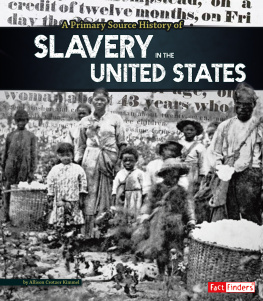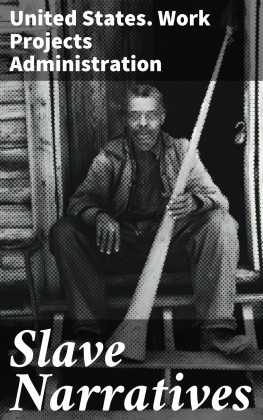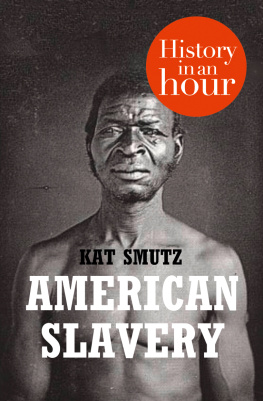Originally published in 1972 by D. Van Nostrand Company.
Published 1998 by Transaction Publishers
Published 2017 by Routledge
2 Park Square, Milton Park, Abingdon, Oxon OX14 4RN
711 Third Avenue, New York, NY 10017, USA
Routledge is an imprint of the Taylor & Francis Group, an informa business
All rights reserved. No part of this book may be reprinted or reproduced or utilised in any form or by any electronic, mechanical, or other means, now known or hereafter invented, including photocopying and recording, or in any information storage or retrieval system, without permission in writing from the publishers.
Notice:
Product or corporate names may be trademarks or registered trademarks, and are used only for identification and explanation without intent to infringe.
Library of Congress Catalog Number: 97-48702
Library of Congress Cataloging-in-Publication Data
Filler, Louis, 1912-
[Slavery in the United States of America]
Slavery in the United States / Louis Filler ; with a new introduction by the author.
p. cm.
Originally published: Slavery in the United States of America. New York : Van Nostrand, 1972.
Includes bibliographical references (p.) and index.
ISBN 0-7658-0431-X (pbk. : alk. paper)
1. SlaveryUnited StatesHistory. 2. SlaveryUnited StatesHistory-Sources. I. Title.
E441.F54 1998
305.56773dc21
97-48702
CIP
ISBN 13: 978-0-7658-0431-0 (pbk)
Slavery is so reprehensible to civilized mindsminds matured in complex and rationalized conditionsthat they would seem unable to accept its premises without great damage to language, social organization, and individual choice. In fact, many civilized areas have by now officially denounced slavery and held it outlawed by civilized standards.
More primitive people, living by old, obsolete traditions, would appear on the surface more vulnerable to the temptations of enslavement, more likely to fall back upon it to ease their own labors, essentially to exploit those of weak mental or physical make-up as individuals or groups on various grounds of ethnic traits, strange and alien. They might so create reasons for ignoring the human wants and status of such inferiors.
In his labor studies, the late Professor Richard B. Morris probed slavery as an institution. His studies premised slavery as an institution, a form of organization, to the annoyance of some of his graduate students, and were not offered to a larger public. Professor Morris made little effort to confront the public with the intricacies of his theory, evidently sensing that people would not be empathetic to his findings.
Yet there are emotional concepts related to slavery which touch the least academic of the general public. Rod Serling, the popular play wright, began his career with a play that depicted a white-collar worker driven to all but madness by the strategies of a superior who demeaned his contributions, allowed him inferior office space, and increasingly diminished his capacity to work. The answer to this, in Serlings play, was increased competition. It would diminish the oppressors authority and make for a more humane business life.
Competition can of course reach formidable competitors to enslave them in a sense. In some cases, such as war, competitors can be forced by government to cooperate, so that their common war can move on. Then, high position, even the highest, can be reduced, as Shakespeare has it, to little more than ceremony. Still, though colonels and generals can die like simple soldiers there is much that separates the officer from the drafted private.
While civilization, then, carries remnants of slavery with it, more primitive civilizations may often bear their burdens more lightly. For one thing, the primitive has fewer possessions for him to quarrel over. The family ranks higher in his culture. The Bushmen of Botswana, for example, is satisfied with the communally slaughtered beast for food and water to drink. Children are precious, for love, for teaching, for the future. Circumstances are not always Edenic, but they contrast, at times fairly well, with the more pandemonic excesses of complex situations.
Today in favored Argentina, that is, in the Buenos Aires area of that large countryone-third the size of the United Statesthe Indians in the back stretch fight for life. Though they resist extermination they show gentler qualities to their own kind.
In earlier civilizations slavery regularly accompanied wars. The records are full of warriors and warrior kings with brothers and children fighting to supersede them. What better way to breathe the air of more expansive lands, to fight for greater satisfactions in food, clothing, and shelter? And once the war or wars ended, the victors decided, with the conquered left in the dust, that what else was there to do with the conquered but to kill the unreconciled, and divide the rest into categoriesall slaves, intellectuals, artisans, household and other useful handsand deal with the remainder as occasion suggested?
Arrangements ranged from the barbaric to the refined. Some were starved to death, for the amusement of the citizenry. Some put to labor in the fields or behind oars. One is reminded of the chances of war affecting Rome itself. Hannibal destroyed its elite forces after coming down from the Alps. Had he not hesitated, giving the desperate Romans a chance to gather new forces, he might indeed have died with his Carthaginian host. But he might instead have destroyed the regal city of Rome and changed the worlds face for a considerable time. Some pangs over slaughter stirred many years later in human breasts. At least they recalled the immortal cry of gladiators in Roman arenas: Ave Caesar.Morituri te salutamus! (Hail Caesar. We who are about to die salute you!) It took time to create such nuances of sensibility. As late as the end of the Punic Wars, Scipio Africanus Minor, conqueror of Carthage, could weep as he saw that noble city burning, bethinking himself that Rome could suffer a like death at some future time, as it did.
It took many centuries before slavery could reach its apogee with the discovery of the New World. The sixteenth century was filled with competitive pro-slavery nations defending their rights with powder and cannon. Spain, France, Italy, and England, and their American colonies, too, offering rum and ships, drew up treaties specifying amounts of slaves who were to be delivered via slave ships for specified amounts of gold, silver, and national currencies. It was a period of chivalrypartly in pride of their own heroes, caught in the networks of war, partly in regard for gallant foes, all part of new and more modern ways. None of these touched slavery, unless they were of a special caste developed over the centuries who, by reason of special conditions, special services, or features of body or mind, occupied a protected category. As late as the early eighteenth century, William Wilberforce, though opposed to slavery and sharing responsibility for its decline under English flags, was respected in the South for his intense piety. At the other extreme was John Scott, Lord Eldon, Chancellor of England, who declared in Parliament that the slave state has been sanctioned by parliaments with the wisest legal experts, the most enlightened theologians, the most eminent statesmen.








